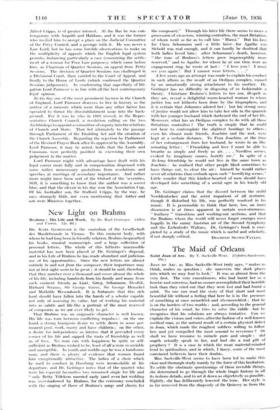New Light on Brahms
Int. KARL GEIRINGER is the custodian of the Gesellschaft der Musikfreunde in Vienna. To this eminent body, with whom he had long been in friendly relation, Brahms bequeathed his books, musical manuscripts and a large collection of personal letters. The whole of this hitherto inaccessible material has now been placed at Dr. Geiringer's disposal, and in his Life of Brahms he has made abundant and judicious use of his opportunities. Since the new letters are almost entirely to and not from the composer, their importance may not at first sight seem to be great ; it should be said, therefore, that they number over a thousand and cover almost the whole of his life, including hundreds from his family and many from such eminent friends as Liszt, Grieg, Schumann, - Dvoffik, Richard Strauss, Sir George Grove, Sir George Henschel and Mathilde Wesendonek. It is fortunate that this rich haul should have fallen into the hands of a scholar capable not only of assessing its value, but of working his material into as subtle and life-like a portrait of the most reserved of composers as we are ever likely to get.
That Brahms was an enigmatic character is well known. His life was torn between conflicting impulses : on the one hand, a strong bourgeois desire to settle down in some per- manent post, work, marry and have children ; on the other, a desire for independence so intense that it pervaded every corner of his life and sapped the roots of friendship as well as of love. No man can with happiness be quite so self- sufficient as Brahms wished to be, least of all a man so sociable and susceptible. In youth and middle-age he was a handsome man, and there is plenty of evidence that women found him exceptionally attractive. The ladies of a choir which he used to conduct in Hamburg were inconsolable at his departure, and Dr. Geiringer notes that of the quartet who were his especial favourites two remained single for life and " only Betty Viikkers married early (and even her wedding was overshadowed by Brahms, for the ceremony concluded with the •singing of three of Brahms's songs and cheers for the composer)." Through his later life there seems to move a procession of vivacious, winning contraltos, the most flirtatious of whom went so far as to call him " Hanoi." But his love for Clara Schumann and—a little later—for Agathe von Siebold was real enough, and it can hardly be doubted that both ladies loved him ; after Schumann's death, however, " the tone of Brahms's letters grew imperceptibly more reserved," and to Agathe, for whom he at one time wore an engagement ring, he wrote at last : " I love you ! I must see you again ! But I cannot wear fetters. . . ."
A few years ago an attempt was made to explain his conduct in such affairs as the result of an Oedipus complex, caused by an unnaturally strong attachment to his mother. Dr. Geiringer has no difficulty in disposing of so fashionable a theory. Christians Brahms's letters to her son, ill-spelt as they are, reveal a delightful warm-hearted woman to whom justice has not hitherto been done by the biographers, and it is certain that Johannes adored her ; but his strong sense of justice would not allow him to take her side in the quarrels with her younger husband which darkened the end of her life. Moreover, what has an Oedipus complex to do with all those flirtatious contraltos ? The truth is simply that he could not bear to contemplate the slightest bondage to others : even his closest male friends, Joachim and the rest, were kept at a certain distance. To Frau Joachim, at the time of her estrangement from her husband, he wrote in an illu- minating letter : " Friendship and love I must be able to breathe as simply and freely as air. . . . Needless scenes, evoked by imaginary causes, horrify me." In spite of a ife-long friendship he would not live in the same town as Joachim : he realised that other people liked sometimes to have things out, to clear the air ; himself he would rather sever all relations than embark upon such " horrifying scenes." Little wonder that this kindest-hearted of men should have developed into something of a social ogre in his lonely old age.
Dr. Geiringer claims that the discord between the stolid Norddeutscher and the artist impatient of all restraint. though it disturbed his life, was perfectly resolved in his music. It is permissible to think that here, too, an inner dissension is at times apparent in certain over-strenuous, " leathery " transitions and working-out sections, and that the Brahms whom the world will never forget emerges most
happily in the sunny Austrian air of the Second Symphony and the Liebestieder Waltzes. Dr. Geiringer's book is com- pleted by a study of the music which is useful and scholarly,










































 Previous page
Previous page